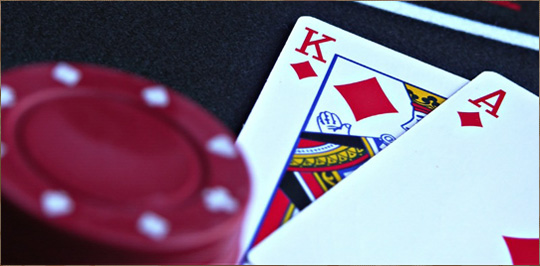Why should you avoid insurance at blackjack?


As permitted under the rule of blackjack if the dealer has an ace card face up, you can take out insurance against his natural, i.e. a hand of 21 with only two cards.
In this case, you must bet half your original bet.
If the dealer gets a natural, well you lose the round but you still win your insurance bet, paid 2 to 1.
In the end, you end up with your initial bankroll because gains of your insurance cover the loss of your bet.
Thus, this game option may seem attractive.
However, if it is subjected to some statistical calculations, we notice very quickly that insurance should actually be avoided.
If the dealer has an ace, to obtain a natural, he needs his face down card to be worth 10.
He therefore needs a face card, i.e. a 10, jack, queen or king.
As a deck contains 16 face cards (4 types of cards x 4 colours: diamond, heart, clubs, spade) and 36 other cards, the probability that the dealer gets 21 is 36 to 16 chances or 2.25 to 1.
The insurance payment is only 2 to 1; you can see this game option is pointless.
Moreover, the tables of the basic strategy do not recommend you to take insurance.
If you still find that the difference between the dealer’s chances of obtaining a natural and the insurance payment is acceptable, please know that the house edge on this bet amounts to 7.69%, which in fact is one of the worst bets possible in a casino.
However, do not write it off too quickly this game option because some players still manage to profit from it.
In fact, if you use a system of counting cards, you can tell if the shoe contains more or fewer face cards.
Depending on the case, it may be then advantageous to choose insurance.
Unfortunately, as I deplored in this blog, card counting has become extremely difficult or even impossible in casinos today.
So, never take the insurance at blackjack.
This simple rule will prevent you from losing money unnecessarily.









